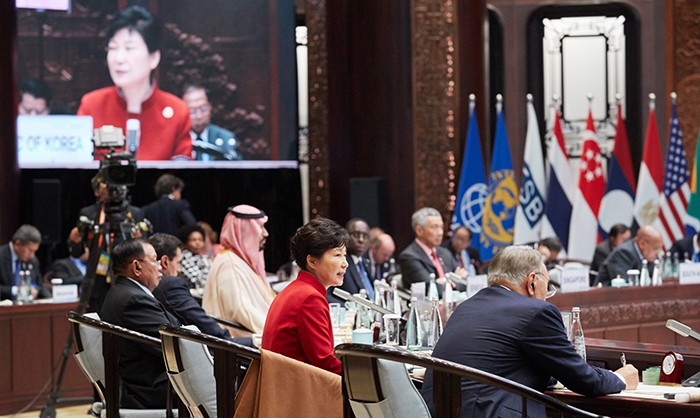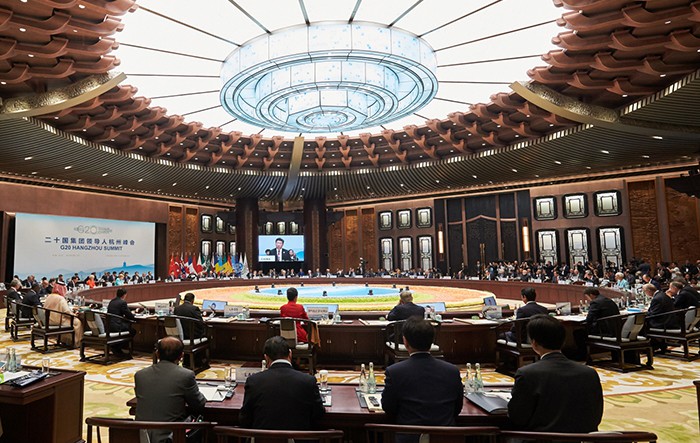
President Park Geun-hye speaks during the G20 summit in Hangzhou, in Zhejiang Province, China. She urged the G20 to play a more active role in expanding free trade and in responding to climate change.
President Park Geun-hye called for G20 governments on Sept. 5 to take proactive steps in order to expand free trade and to respond to global climate change.
President Park said, “Decreased trade and the spread of protectionism could shake up the foundation of a world economy that is based on the liberalization of free trade and investment.” She was speaking in the third and fifth sessions of the G20 summit in Hangzhou, in Zhejiang Province, China.
President Park made three proposals to bolster the world’s system of free trade.
President Park pointed out to the world leaders that, “The G20 countries, which account for almost 80 percent of world trade, should play an active role in order to spread free trade.”
Mentioning the Great Depression of the 1930s and the oil crisis of the 1970s, she warned the participating leaders that, “If protectionism is strengthened, the world should not forget the historical lesson that strengthening trade protectionism is hazardous for all, as shown by past example.”
“The fruits of free trade should be given to more people,” said President Park.
“A growing number of people fail to enjoy the fruits of growth based on free trade, which leads to the spread of protectionism and neo-isolationism,” she said.
“The essence of the problem is not free trade itself, but the issue of how we can share the benefits, and this issue should be addressed through inclusive, innovative growth,” said President Park.
In regard to global climate change, President Park urged the G20 to take more active action, saying that, “The world should regard responding to climate change as an opportunity to foster new energy industries.”
She asked for the G20 leaders to take continued interest in and to support the Green Climate Fund (GCF) so that it could play an important role in this regard.
President Park proposed sharing new technologies and project models in order to support economic development in other countries, while emphasizing the fact that developing economies must participate in the process if the G20 hopes to successfully implement the new climate change rules that were ratified at the past G20 gathering.

The two-day G20 summit in Hangzhou closed on Sept. 5 after adopting the Hangzhou Consensus. The creative economy vision that President Park proposed as a new model of inclusive growth is reflected in the G20’s statement, action plan and annex, as all three documents stressed ‘innovation’ as one of the most important items on the agenda.
The G20 adopted the Hangzhou Consensus joint statement and then wrapped up the two-day gathering. In the statement, world leaders opposed protectionism on trade and investment, and pledged with one united voice to use all possible policy tools to promote growth across the world economy.
Reflecting the fact that the creative economy vision presented by President Park could be used as a new model of inclusive growth, the G20 highlighted “innovation” as one of the most important agenda items in the joint statement, in its core annex, “G20 Blueprint for Growth-related Innovation,” and in its “Innovation Action Plan.”
In the Hangzhou Consensus, the G20 leaders said, “We recognize that in the long run innovation is a key driver of growth for both individual countries and for the global economy as a whole.”
“We thus endorse the G20 Blueprint on Innovative Growth as a new agenda encompassing policies and measures in and across areas of innovation, the new industrial revolution and the digital economy,” said the statement.
By Yoon Sojung
Korea.net Staff Writer
Photos: Cheong Wa Dae
arete@korea.kr























